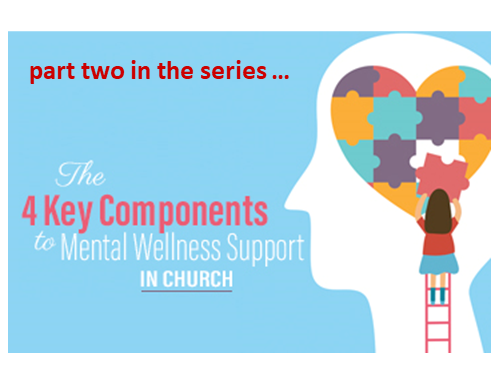
Taste and See God’s Goodness: The Jackson Willms Story
As I glanced out the front window and watched Jackson Willms and his care aide make their way up the...
Join us online at 9:00 am and 11:00 am Watch Online

With this article we are continuing our series on mental wellness support in the church.
Before we look at how abiding in Christ affects our mental wellness, let’s make sure we’re clear about what the term mental wellness means. It doesn’t just mean feeling happy or joyful. It includes having:
• A strong sense of purpose;
• Good connection with others through solid, supportive relationships;
• A good sense of self;
• The ability to cope with stress;
• A sense of satisfaction and joy in life.
It’s also important to understand that the four components of mental wellness support in the church are not all equal. Faith is not just one of the components, it is THE foundational component. The other three factors – lifestyle, social connection, and control of thoughts – work best when built upon this base.
A Sure Foundation
I’ve often used the analogy of a stool to describe this relationship. Think of living life as sitting on that stool – we want our perch to be steady and secure. Not wobbly and tipping all over the place.
The three factors I’ll explore in more depth in upcoming weeks can be seen as the three legs of the stool. It makes sense that each one individually has to be strong, and that they all need to be of equal length.
However, you could have the best stool in the world, with three sturdy legs that are perfectly matched, but if it’s placed on a slope or uneven ground it will still lurch and sway. It needs a level, firm base. Our stable foundation, our base, is Jesus.
Supernatural Natural Healing
Why is it so crucial to have this perspective?
When our foundation is faith, and we’ve accepted Jesus as our Savior, the Holy Spirit (Jesus called Him ‘the Helper’ in John 16:7) then comes to dwell in us. He can prompt us, so that we recognize the need for change.
Then as we commit and start to take action – whether it’s being more intentional about spiritual disciplines, improving lifestyle, changing our thought patterns or loving others – He guides us and strengthens us.
If we set out on a course of ‘self-improvement’ relying solely on our own fleshly power, we are doomed to failure.
My healing from severe depression was not due to my own knowledge, wisdom or strength. I know it took supernatural power to create this change. Several close friends, who knew me during my worst times, have called my healing a miracle. Not an instantaneous miracle, but one that occurred over time as God worked supernaturally, naturally. He used people, circumstances and events to provide me each next step I needed to take. The Holy Spirit gave me the energy, stamina and hope I needed to follow through and persist.
How Faith Impacts Mental Wellness
To illustrate how interrelated faith and mental wellness are, let’s look at the characteristics of a Christ-centered life:
• Knowledge of one’s ultimate purpose;
• A secure sense of identity as God’s beloved child;
• Love for others, a servant heart;
• Growth in the fruits of the Spirit;
• Joy that is not circumstance-dependent.
Compare this to the first list I mentioned – do you see the overlap?
Once I know that in Christ I am accepted and beloved, a child of God, and holy and without blame (see Ephesians 1:3-6), I have the best defense against the accusation, “I’m not good enough.”
Once I experience grace in friendships with other believers – instead of judgment and condemnation – I will be more open and vulnerable, leading to more intimate connection.
Once I practice forgiveness, I can move past bitterness and resentment.
As I grow in my love for Jesus and desire to become more like Him, I will follow His commandments and (more often) love others sacrificially. I will more and more put others’ success before my own. Won’t that affect my relationships and connectedness in a positive way?
As I study the Word, my mind will become saturated with truth. In Romans 12:2 the Apostle Paul declares that we can “be transformed by the renewing of our mind.”
All these examples of how faith can impact mental wellness do not comprise an exhaustive list, but I hope you’re getting the idea.
Grace for Those Experiencing Mental Wellness Challenges
There is one thing that can be a pitfall of mental wellness support in the church. Symptoms such as anxiety or depression are occasionally viewed to be exclusively of a spiritual nature. One may get the direct, or indirect, message that, “Real believers don’t suffer from mental illness”, or the advice, “Study the Word more and pray more!”
When someone literally cannot focus or concentrate because of physiological changes in the brain, these suggestions lead to feelings of shame and guilt. It’s important to remember there are many contributing factors to mental health issues.
Let’s extend grace and love to those who are suffering. Encourage them to explore as many of the contributing factors as possible, while still doing what is manageable in the spiritual realm. Sometimes that may be just repeating a single verse or listening to worship music.
Feel free to contact me with any questions at drczeg@gmail.com.
Magda Czegledi has a unique perspective on mental health issues through her experience as a family doctor, a family member and as a patient. While experiencing a depression so severe she had to leave her family practice, she later recovered through a combination of her growing faith in Christ and basic lifestyle change. Currently, Magda works as a speaker, small group facilitator and peer support trainer.

As I glanced out the front window and watched Jackson Willms and his care aide make their way up the...

Several years ago, Pastor Blair Butterfield was at a pastors’ conference in Lima, Peru where he bumped into a man...

The world tells us we can do it all. Try hard enough, work enough hours, do all the right things...